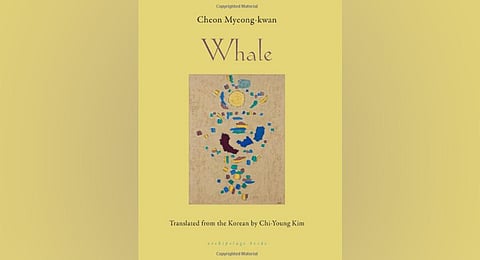

This is the story of Chunhui, or the Girl of Spring who, decades after her death, is celebrated as the Red Brick Queen. This is also the story of Chunhui’s mother Geumbok, whose dogged pursuits, ever since she saw a whale crest in the ocean, led her to turn an obscure village into a buzzing commercial centre. This is also the story of the one-eyed woman who walks miles covered in bees, bringing along with her the curse of a sting wherever she goes. And finally, this is the story of her mother, known as the old crone, who sells her daughter for two jars of honey to a beekeeper.
It’s these four characters that are central to novelist Cheon Myeong-kwan’s Whale, first published two decades ago in South Korea. This is the author’s debut novel, which soon became one of the most-loved works of literature in the East-Asian country, and is regarded as a modern classic. The book, translated into English by Chi-young Kim, was fittingly shortlisted for the International Booker Prize 2023, and won some rave reviews. Set in Pyeongdae, a village in South Korea, the novel beautifully sketches civilisation, and shows how capitalism took shape as it focuses on the country’s transition from a pre-modern to post-modern society.
This adventurous tale of magic realism is satirical and brutal in equal parts, and scores by not playing the victim card. Each character has been vicious at some point and, at other times, has shown their vulnerable side. In fact, every character is a victim of the circumstances. This is perhaps why every few chapters, the author says, “This was the law of…” The ending to the sentence varies from capitalism to rumours, love to reproduction, sorrow to nature, action and reaction. It is as if he is justifying the tale, the existence of human weaknesses, without glorifying anyone’s pain or vilifying anyone’s greed. The way history is adapted to suit literary sensibilities, thereby altering the course of facts, too has been cleverly portrayed and is a mirror to the times we live in.
This 20th-century novel is strangely reminiscent of Charles Dickens’s Great Expectations in how it lays bare the ambition and materialism that have driven societies for aeons now. It leaves the readers with no unanswered questions as there are multiple hidden meanings to be drawn out of the way every event shapes up in the story; even a circus elephant in Whale evokes pertinent thoughts. Simply put, this is a novel that leaves you with a tinge of sorrow for life itself.